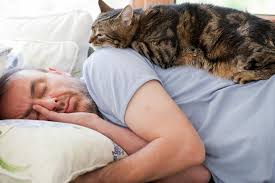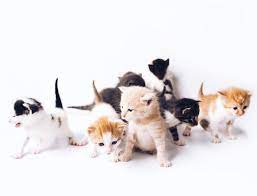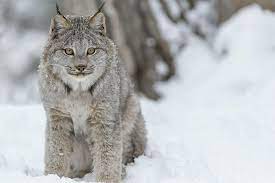What Does It Mean When Your Cat Sleeps on You


Cats are known for their independent and aloof nature, but when they choose to sleep on their owners, it can be both endearing and puzzling. If you’ve ever wondered why your feline companion enjoys curling up on you for a nap, there are several reasons behind this behavior. In this article, we’ll explore the possible meanings and motivations behind a cat’s decision to sleep on their human.
Why do cats sleep on their owners?
Comfort and security
One of the primary reasons cats choose to sleep on their owners is the sense of comfort and security they derive from it. As natural predators, cats are constantly aware of their surroundings and potential threats. By snuggling up on their owner’s lap or beside them in bed, they can feel safe and protected, knowing that their trusted human is nearby.
Bonding and affection
Sleeping in close proximity allows cats to strengthen their bond with their owners. Cats are social animals, and sleeping together promotes a sense of intimacy and companionship. By sharing sleeping space, cats and their owners engage in a nonverbal form of communication, fostering a deeper emotional connection.
Temperature regulation
Cats are naturally attracted to warm places, and their owners’ bodies provide a cozy and comfortable spot to sleep. The warmth generated by a human’s body is comforting for cats, especially during colder seasons. Your body heat acts as a natural heat source, making you an appealing sleeping companion for your feline friend.
Territory marking
When a cat sleeps on their owner, it can also be a way of marking their territory. Cats have scent glands on various parts of their bodies, and by sleeping on you, they leave their scent as a way of claiming you as part of their territory. This behavior is especially prevalent in cats that view their owners as important family members.
The science behind a Cat’s sleep behavior
Understanding the science behind a cat’s sleep behavior can shed light on why they choose certain sleeping arrangements.
Sleep patterns of cats
Cats are crepuscular animals, meaning they are most active during dawn and dusk. They have adapted to this schedule from their ancestors who were nocturnal hunters. As a result, cats tend to have multiple sleep-wake cycles throughout a 24-hour period.
The stages of sleep
Similar to humans, cats go through different stages of sleep, including light sleep, deep sleep, and REM (Rapid Eye Movement) sleep. During light sleep, cats can easily wake up, while deep sleep is characterized by relaxed muscles and decreased brain activity. REM sleep is associated with dreaming and is when most of the brain activity occurs.
Signs of a cat’s affectionate sleep behavior
When a cat sleeps on their owner, it may exhibit certain behaviors that indicate affection and contentment.
Kneading
Kneading is a common behavior in cats that mimics the actions they performed as kittens when nursing. When a cat kneads on you, it’s a sign of comfort and trust.
Purring
Purring is a well-known feline behavior associated with contentment and relaxation. If your cat purrs while sleeping on you, it’s a clear indication that they feel safe and comfortable in your presence.
Grooming
Cats are meticulous groomers, and if they groom themselves while sleeping on you, it’s a sign of trust and acceptance. Grooming is an essential part of their routine, and they choose to engage in this behavior when they feel secure.
Eye contact
While sleeping, if your cat occasionally opens their eyes to make eye contact with you, it’s a sign of trust and affection. Eye contact is an important form of communication among cats, and when they do it while sleeping, it reinforces the bond between you and your pet.
See also: Why Does My Cat Bite My Legs?
Understanding your cat’s sleeping preferences
Each cat has its own unique sleeping preferences, and understanding them can help create a comfortable environment for both you and your feline companion.
Preferred sleeping spots
Cats have individual preferences when it comes to sleeping spots. Some may prefer sleeping on your lap, while others may opt for curling up beside you in bed. Pay attention to your cat’s choices and provide comfortable spaces accordingly.
Time of day for sleeping
As crepuscular animals, cats may have different sleeping patterns compared to humans. Respect their natural sleep-wake cycles and provide them with uninterrupted rest during the day or night, depending on their preferences.
Individual cat preferences
Just like humans, cats have their own personalities and preferences. Some cats may be more inclined to sleep on their owners, while others may prefer their own space. Understand and respect your cat’s individual preferences to maintain a harmonious relationship.
Benefits of cats sleeping on their owners
Apart from the emotional connection and bonding, there are several benefits to having your cat sleep on you.
Stress reduction
The presence of a purring cat can be soothing and help reduce stress levels. The rhythmic sound of their purring, combined with their warm presence, can create a calming effect and help you relax.
Improved sleep quality
Contrary to popular belief, having a cat sleep on you can improve your own sleep quality. The feeling of security and companionship can promote a sense of relaxation, leading to a more restful night’s sleep.
Emotional support
Cats are known to be intuitive animals, and when they choose to sleep on you, it can provide emotional support. Their presence can be comforting during times of stress, anxiety, or loneliness.
Strengthened bond
Sharing sleeping space with your cat can strengthen the bond between you. It creates a sense of trust and deepens the connection you have with your feline companion.
What to do if your cat’s sleeping behavior becomes disruptive
While having your cat sleep on you can be enjoyable, there may be instances where their behavior becomes disruptive or uncomfortable.
Providing alternative sleeping spots
If your cat’s sleeping behavior becomes disruptive or you find it uncomfortable, provide alternative sleeping spots that are cozy and appealing. Offer comfortable cat beds or blankets in areas where they can still be near you without disturbing your sleep.
Establishing a routine
Establishing a consistent routine for your cat’s sleep can help manage their behavior. Cats thrive on routine, and by providing a structured sleep schedule, you can encourage them to sleep in their designated areas.
See also: Why Is My Cat’s Eye Watering and Squinting?
Seeking veterinary advice if necessary
If your cat’s sleeping behavior suddenly changes or becomes excessively clingy, it’s essential to consult a veterinarian. Sudden changes in behavior could be an indication of an underlying health issue that requires medical attention.
Conclusion
When your cat chooses to sleep on you, it’s a sign of trust, affection, and a desire for comfort and security. By understanding the reasons behind this behavior and respecting your cat’s preferences, you can nurture a strong bond and enjoy the benefits of their presence. Remember to provide alternative sleeping options and seek professional advice if necessary to ensure a harmonious coexistence.
FAQs about What Does It Mean When Your Cat Sleeps on You
Is it normal for cats to sleep on their owners?
Yes, it is normal for cats to sleep with their owners. It’s a sign of affection and a way for them to feel secure and comfortable.
Why does my cat sleep on my face?
Sleeping on your face could be a way for your cat to seek warmth, affection, or attention. However, it’s important to ensure that your cat’s sleeping habits do not interfere with your breathing or pose any safety risks.
Should I let my cat sleep in my bed?
Allowing your cat to sleep in your bed is a personal choice. If you enjoy the companionship and find it comfortable, it’s perfectly fine. However, if it disrupts your sleep or causes any discomfort, you can provide alternative sleeping spots.
What if my cat’s sleeping behavior changes suddenly?
Sudden changes in your cat’s sleeping behavior could be a cause for concern. If you notice any unusual changes, such as excessive clinginess or restlessness, it’s best to consult a veterinarian to rule out any underlying health issues.
Can cats suffocate when they sleep on humans?
While it’s unlikely for a cat to suffocate while sleeping on humans, it’s important to ensure that your breathing is not restricted. Maintain a safe sleeping position and provide your cat with alternative sleeping options if needed.





